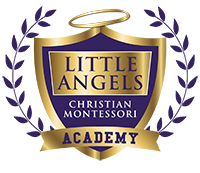
Why Montessori?
Montessori Education is both a philosophy of child development and a rationale for quality in that development. The special method, named for the Italian physician Maria Montessori, stresses the importance of the development of a healthy self-concept. Education, she believed, is a preparation for life, not merely a search for intellectual skills. The child has one intuitive aim – his self development. He desperately wants to develop his inner resources and his ability to cope with a strange, complex world. The child who accomplishes this moves into harmony with his world and becomes a full person.
The Montessori method pursues the fact that the mind of the very young child is absorbent and thus the environment should be prepared carefully to train his senses, to stimulate his curiosity, to satisfy his need to know and to protect him from unnecessary failure. Montessori’s philosophy and psychological principles led her to devise carefully graded series of self-teaching devices that are now commonly accepted and supported by current research. Each school typifies Montessori education through its concern for the environment, the child and the teacher.
The Environment
Each Montessori school provides a precisely prepared Montessori environment which fosters satisfaction in learning by discovery and a joy in achievement. The climate and selected activities are prepared to interest and motivate the child and to protect him from unnecessary failure. The Montessori materials develop basic problem solving and observational techniques. The child begins in the concrete and manipulative materials and gradually works toward the abstract.
Montessori’s recognition of the importance of a stimulating environment as a means of “freeing the child’s potential” is now supported by a multitude of studies in early learning. The classroom is equiped with specially designed and sequenced materials which Dr. Montessori devised. These materials, together with highly trained and administrators, provide a classroom where the child is stimulated and challenged, but never pressured. In such a climate the child learns to feel good about himself. His right to dignity and worth are protected.
The Child
The very young child is in the process of forming his first impressions of his own nature and ability; of other people; and of life in general – impressions that can last a lifetime. To reach the highest potential possible, the child must develop a healthy self-concept; wholesome attitudes and values; desirable skills and habits; independence and self-reliance; the ability to adjust and to think reflectively; as well as a sensitivity in human relationships and a curiosity and appreciation of nature and the world that surrounds him.
The Teacher
The role of the Montessori Directress differs considerably from that of a traditional teacher. She observes and assists the child according to the child’s individual needs and interests. She is trained to recognize periods of readiness and to demonstrate the correct use of the material to the children. She reinforces in a positive manner. At times she may encourage a hesitant child. At other times, she may divert a child who chooses material beyond his ability. She protects the child’s integrity and allows the child to have the freedom of choice to make decisions. The child’s decisions are expected to reflect a sense of responsibility. He is helped by the Directress’ manner, which is firm and consistent, yet patient and gentle.
